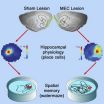(Press-News.org) WASHINGTON - Hospital workers who deal directly with patients wash their hands less frequently as their workday progresses, probably because the demands of the job deplete the mental reserves they need to follow rules, according to new research published by the American Psychological Association.
Researchers led by Hengchen Dai, a PhD candidate at the University of Pennsylvania, looked at three years of hand-washing data from 4,157 caregivers in 35 U.S. hospitals. They found that "hand-washing compliance rates" dropped by an average of 8.7 percentage points from the beginning to the end of a typical 12-hour shift. The decline in compliance was magnified by increased work intensity.
"Just as the repeated exercise of muscles leads to physical fatigue, repeated use of executive resources (cognitive resources that allow people to control their behaviors, desires and emotions) produces a decline in an individual's self-regulatory capacity," the researchers wrote.
More time off between shifts appeared to restore workers' executive resources - they followed hand-washing protocol more carefully after longer breaks.
"Demanding jobs have the potential to energize employees, but the pressure may make them focus more on maintaining performance on their primary tasks (e.g., patient assessment, medication distribution), particularly when they are fatigued," Dai said. "For hospital caregivers, hand-washing may be viewed as a lower-priority task and thus it appears compliance with hand hygiene guidelines suffers as the workday progresses."
Hand-washing in hospitals has been demonstrated to reduce infections and save money. In a 2000 study of Swiss hospitals, researchers found that a 1 percentage point increase in hand-washing compliance reduced the number of infections by 3.9 per 1,000 patients. Another study, in 2009, estimated that the cost per patient with a health care-acquired infection is $20,549. Using these data, Dai and her colleagues extrapolated their findings to all 5,723 registered hospitals in the United States and estimated that there would be an additional 600,000 infections per year at a cost of approximately $12.5 billion annually.
"We believe ours is the first study investigating whether accumulated work demands can affect rule compliance over the course of a single workday, as opposed to over weeks, months or years," said Katherine L. Milkman, PhD, another member of the research team. "We think this line of research could be applied to other types of workplace compliance, such as ethics standards in banking, safe driving behaviors in trucking and safety standards in manufacturing."
The researchers used data from Proventix, a company that focuses on helping health care providers improve their hand hygiene. Proventix uses radio frequency identification (RFID) technology to monitor whether health care workers are washing their hands as recommended - i.e., within a specified number of seconds of entering and leaving a patient's room. Communication units attached to hand soap and sanitizer dispensers read the workers' RFID badges.
Sixty-five percent of the caregivers in the sample were nurses. The remainder were patient care technicians (12 percent), therapists (7 percent), physicians (4 percent) and a handful of other types of employees.
INFORMATION:
Article: "The Impact of Time at Work and Time Off From Work on Rule Compliance: The Case of Hand Hygiene in Health Care," Hengchen Dai, PhD candidate, and Katherine L. Milkman, PhD, The Wharton School, University of Pennsylvania; David A. Hofmann, PhD, and Bradley R. Staats, PhD, University of North Carolina Kenan-Flagler Buseinss School; online Nov. 3, 2014, Journal of Applied Psychology.
Full text of the article is available from the APA Public Affairs Office and at http://www.apa.org/pubs/journals/releases/apl-a0038067.pdf.
Contact: Hengchen Dai at hengchen@wharton.upenn.edu or (215) 898-0466.
The American Psychological Association, in Washington, D.C., is the largest scientific and professional organization representing psychology in the United States. APA's membership includes nearly 130,000 researchers, educators, clinicians, consultants and students. Through its divisions in 54 subfields of psychology and affiliations with 60 state, territorial and Canadian provincial associations, APA works to advance the creation, communication and application of psychological knowledge to benefit society and improve people's lives.
http://www.apa.org
If you do not want to receive APA news releases, please let us know at public.affairs@apa.org or 202-336-5700.
The Assyrian Empire once dominated the ancient Near East. At the start of the 7th century BC, it was a mighty military machine and the largest empire the Old World had yet seen. But then, before the century was out, it had collapsed. Why? An international study now offers two new factors as possible contributors to the empire's sudden demise - overpopulation and drought.
Adam Schneider of the University of California, San Diego and Selim Adalı of Koç University in Istanbul, Turkey, have just published evidence for their novel claim.
"As far as we know, ...
Results of a federally-funded pooled analysis of five prospective cohort studies indicate that cigarette smoking prior to the first diagnosis of lung (stage I), bladder, kidney or head and neck cancer increases risk of developing a second smoking-associated cancer. This is the largest study to date exploring risk of second cancers among current smokers.
An analysis of five large, prospective cohort studies indicates that lung (stage I), bladder, kidney and head and neck cancer survivors who smoked 20 or more cigarettes a day prior to their cancer diagnoses have an up ...
Nestled among a triplet of young galaxies more than 12.5 billion light-years away is a cosmic powerhouse: a galaxy that is producing stars nearly 1,000 times faster than our own Milky Way. This energetic starburst galaxy, known as AzTEC-3, together with its gang of calmer galaxies may represent the best evidence yet that large galaxies grow from the merger of smaller ones in the early Universe, a process known as hierarchical merging.
An international team of astronomers observed these remarkable objects with the Atacama Large Millimeter/submillimeter Array (ALMA).
"The ...
VIDEO:
Dartmouth researchers say lung cancer screening in the National Lung Screening Trial meets a commonly accepted standard for cost effectiveness as reported in the Nov. 6 issue of the New...
Click here for more information.
Dartmouth researchers say lung cancer screening in the National Lung Screening Trial (NLST) meets a commonly accepted standard for cost effectiveness as reported in the Nov. 6 issue of the New England Journal of Medicine. This relatively new screening ...
Imagine being able to recognize your car as your own but never being able to remember where you parked it. Researchers at University of California, San Diego School of Medicine have induced this all-too-common human experience - or a close version of it - permanently in rats and from what is observed perhaps derive clues about why strokes and Alzheimer's disease can destroy a person's sense of direction.
The findings are published online in the current issue of Cell Reports.
Grid cells and other specialized nerve cells in the brain, known as "place cells," comprise ...
Cats and humans have shared the same households for at least 9,000 years, but we still know very little about how our feline friends became domesticated. An analysis of the cat genome by researchers at Washington University School of Medicine in St. Louis reveals some surprising clues.
The research appears Nov. 10 in the Proceedings of the National Academy of Sciences Early Edition.
Cats have a relatively recent history of domestication compared with dogs; canines arose from wolves over 30,000 years ago.
"Cats, unlike dogs, are really only semidomesticated," said ...
A massive new University of Colorado Boulder study indicates there is a statistical link between hotter temperatures generated by climate change and the risk of armed conflicts in sub-Saharan Africa.
CU-Boulder Professor John O'Loughlin led a research team that assessed more than 78,000 armed conflicts between 1980 and 2012 in the Sahel region of Africa - a semi-arid belt just south of the Saharan Desert that spans about 3,000 miles and more than a dozen countries from the Atlantic to the Indian oceans.
The team was looking for links between armed conflicts and temperature ...
HOUSTON - (Nov. 10, 2014) - An analysis of more than 100 health insurance plans across Texas offered under the Affordable Care Act (ACA) shows that plans can differ significantly in premium cost and the number of hospitals included in insurance networks. That's just one of the findings of a report released today by the Episcopal Health Foundation and Rice University's Baker Institute for Public Policy.
The report examined "Silver" health insurance plans offered by insurers within the ACA's Marketplace. Texas is divided into 26 different geographic areas, with different ...
Philadelphia, PA, November 10, 2014 - Beta-blockers have been a cornerstone in the treatment of heart attack survivors for more than a quarter of a century. However, many of the data predate contemporary medical therapy such as reperfusion, statins, and antiplatelet agents, and recent data have called the role of beta-blockers into question. Two new studies published in The American Journal of Medicine evaluated the traditional management of these patients after their discharge from the hospital and in the light of changing medical treatment, as well as the impact of the ...
The adult human body is made up of about 37 trillion cells. Microbes, mainly bacteria, outnumber body cells by 10 to 1. Increasingly, scientists recognize that this huge community of microbes, called the microbiome, affects the health, development and evolution of all multicellular organisms, including humans.
Studies show symbiotic microbes can help prevent infection by disease-causing pathogens. But sometimes the interaction goes the other way, with a pathogen or disease disrupting the normal community of symbiotic bacteria. In a new study, a team of scientists from ...




